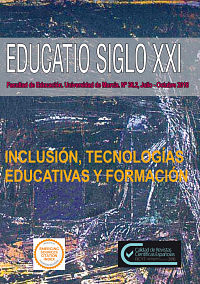Collaborative Culture in a School: Contributions from Counseling
Abstract
Change processes focused on improvingeducational inclusion are a necessary ele-
ment for schools. In this sense, cooperati-
ve learning appears to be a true innovation
for educational institutions, giving a valid
response for this issue. In order to pursue
this goal, collaborative counseling strate-
gies can be used, considering that students’
cooperation must be aligned with teachers’
cooperation and with the other agents in-
volved in educational communities. One
of these strategies is defined according to
a number of adaptable phases: (a) creating
the conditions in order to face the imple-
mentation of the cooperative project and
initial assessment of the teaching network;
(b) planning and implementation; (c) de-
veloping and monitoring the plan; (d) as-
sessing and proposing improvements. The
main goal of this research was to identify
and understand the essential implications
of this training proposal. To this end, we
undertook a case study in a school of the Community of Madrid, collecting informa-
tion extracted in interviews, focus groups,
reviewing documents, observing and
using surveys. Results highlighted an im-
pact on three main areas: school organiza-
tion, teachers’ professional development
and students’ learning.
Downloads
-
Abstract1502
-
PDF (Español (España))1475
Original work publishes in this journal is subject to the following terms:
1. Murcia University Press (the publishing house) holds the copyright of the publishes work, and favours and allows their reutilization under the use license stated in point 2.
© Servicio de Publicaciones, Universidad de Murcia, 2015
2. Work is published in the electronic edition under a license (Creative Commons Reconocimiento-NoComercial-SinObraDerivada 4.0 España (legal text). They can be copied, used, disseminated, transmitted and publicly presented, as long as: i) authorship and original publication source is acknowledged (journal, publishing house and URL of the work); ii) are not used for commercial purposes; iii) the existence and specifications of this use license is stated.
3. Conditions for self-archive. Authors are allowed and encouraged to disseminate electronically the pre-pint (before review) and/or post-print (accepted for publication) versions of their work before their publication since that favours earlier circulation and dissemination resulting in an increased chance for the authors to be cited and for the work to reach a bigger share of the academic community. Colour: RoMEO: green.








